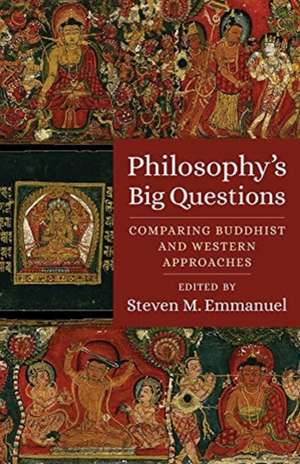Philosophy′s Big Questions – Comparing Buddhist and Western Approaches
Autor Steven M. Emmanuel, Stephen J. Laumakis, Douglas S. Duckworth, Jan Westerhoff, Dan Arnolden Limba Engleză Paperback – 2 sep 2021
| Toate formatele și edițiile | Preț | Express |
|---|---|---|
| Paperback (1) | 238.69 lei 6-8 săpt. | |
| Columbia University Press – 2 sep 2021 | 238.69 lei 6-8 săpt. | |
| Hardback (1) | 704.53 lei 6-8 săpt. | |
| Columbia University Press – 2 sep 2021 | 704.53 lei 6-8 săpt. |
Preț: 238.69 lei
Nou
Puncte Express: 358
Preț estimativ în valută:
45.67€ • 47.81$ • 37.79£
45.67€ • 47.81$ • 37.79£
Carte tipărită la comandă
Livrare economică 07-21 aprilie
Preluare comenzi: 021 569.72.76
Specificații
ISBN-13: 9780231174879
ISBN-10: 023117487X
Pagini: 304
Dimensiuni: 149 x 224 x 18 mm
Greutate: 0.41 kg
Editura: Columbia University Press
ISBN-10: 023117487X
Pagini: 304
Dimensiuni: 149 x 224 x 18 mm
Greutate: 0.41 kg
Editura: Columbia University Press
Notă biografică
Steven M. Emmanuel is professor of philosophy and dean of the Susan S. Goode School of Arts and Humanities at Virginia Wesleyan University. He is the editor of Buddhist Philosophy: A Comparative Approach (2018) and A Companion to Buddhist Philosophy (2013), as well as many publications on major figures in the modern European tradition.
Cuprins
Foreword, by Leah Kalmanson
Acknowledgments
List of Abbreviations
Editor¿s Introduction, by Steven M. Emmanuel
1. How Should We Live? Happiness, Human Flourishing, and the Good Human Life, by Stephen J. Laumakis
2. What Is Knowledge? Knowledge in the Context of Buddhist Thought, by Douglas Duckworth
3. Does Reality Have a Ground? Madhyamaka and Nonfoundationalism, by Jan Westerhoff
4. Can Consciousness Be Explained? Buddhist Idealism and the ¿Hard Problem¿ in Philosophy of Mind, by Dan Arnold
5. Is Anything We Do Really Up to Us? Western and Buddhist Philosophical Perspectives on Free Will, by Rick Repetti
6. Why Do Bad Things Happen to Good People? ¿And None of Us Deserving the Cruelty or the Grace¿¿Buddhism and the Problem of Evil, by Amber D. Carpenter
7. How Much Is Enough? Greed, Prosperity, and the Economic Problem of Happiness¿a Comparative Perspective, by Steven M. Emmanuel
8. What Do We Owe Future Generations? Compassion and Future Generations¿a Buddhist Contribution to an Ethics of Global Interdependence, by Peter D. Hershock
Concluding Remarks, by Steven M. Emmanuel
For Further Reading and Study
Contributors
Index
Acknowledgments
List of Abbreviations
Editor¿s Introduction, by Steven M. Emmanuel
1. How Should We Live? Happiness, Human Flourishing, and the Good Human Life, by Stephen J. Laumakis
2. What Is Knowledge? Knowledge in the Context of Buddhist Thought, by Douglas Duckworth
3. Does Reality Have a Ground? Madhyamaka and Nonfoundationalism, by Jan Westerhoff
4. Can Consciousness Be Explained? Buddhist Idealism and the ¿Hard Problem¿ in Philosophy of Mind, by Dan Arnold
5. Is Anything We Do Really Up to Us? Western and Buddhist Philosophical Perspectives on Free Will, by Rick Repetti
6. Why Do Bad Things Happen to Good People? ¿And None of Us Deserving the Cruelty or the Grace¿¿Buddhism and the Problem of Evil, by Amber D. Carpenter
7. How Much Is Enough? Greed, Prosperity, and the Economic Problem of Happiness¿a Comparative Perspective, by Steven M. Emmanuel
8. What Do We Owe Future Generations? Compassion and Future Generations¿a Buddhist Contribution to an Ethics of Global Interdependence, by Peter D. Hershock
Concluding Remarks, by Steven M. Emmanuel
For Further Reading and Study
Contributors
Index
Descriere
Descriere de la o altă ediție sau format:
The essays in this book turn to the major figures and texts of the Buddhist tradition in order to expand and enrich our thinking on enduring philosophical questions. Featuring striking and generative comparisons, Philosophy’s Big Questions offers readers new conceptual tools, methods, and insights for the pursuit of a good and happy life.
The essays in this book turn to the major figures and texts of the Buddhist tradition in order to expand and enrich our thinking on enduring philosophical questions. Featuring striking and generative comparisons, Philosophy’s Big Questions offers readers new conceptual tools, methods, and insights for the pursuit of a good and happy life.
